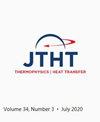Investigation on the Flow Instability of Supercritical Hydrocarbon Fuels in Cooling Channels
IF 1.7
4区 工程技术
Q4 ENGINEERING, MECHANICAL
引用次数: 0
Abstract
Flow instability in regenerative cooling channels is an important issue for the thermal protection of hypersonic scramjet engines. Taking into account the dynamic process of the heat transfer and flow instability, a one-dimensional transient model with several modules (including the cracking reaction, convective heat transfer, and rapid calculation of thermal properties) has been developed to investigate the flow instability characteristics of supercritical hydrocarbon fuels in cooling channels. The calculated results were compared and validated against the available experiments and numerical benchmarks, attaining good agreements. By virtue of the transient simulations, the dynamic flow patterns under different flow rates were studied in a single cooling channel with [Formula: see text]-decane being the working substance. Then, the influences of the operating pressure and heated length on the in-tube flow were further investigated. In addition to the Ledinegg instability, several dynamic instability modes were detected under different external driving forces. It was also observed that under a specific range of pressure drop, the in-tube flow could transition from the density-wave oscillation to a new steady state. Moreover, this flow excursion was more likely to be triggered when decreasing the operating pressure or channel length.超临界碳氢燃料在冷却通道中流动不稳定性的研究
再生冷却通道中的流动不稳定性是高超音速超燃冲压发动机热保护的一个重要问题。考虑到传热和流动不稳定的动态过程,建立了一个包含多个模块(包括裂化反应、对流传热和热性能快速计算)的一维瞬态模型,以研究超临界碳氢燃料在冷却通道中的流动不稳定特性。将计算结果与现有的实验和数值基准进行了比较和验证,取得了良好的一致性。通过瞬态模拟,研究了以[公式:见正文]-癸烷为工作物质的单个冷却通道中不同流速下的动态流动模式。然后,进一步研究了操作压力和加热长度对管内流动的影响。除了Ledinegg不稳定外,在不同的外部驱动力下还检测到几种动态不稳定模式。还观察到,在特定的压降范围内,管内流动可以从密度波振荡转变为新的稳态。此外,当降低操作压力或通道长度时,这种流动偏移更有可能被触发。
本文章由计算机程序翻译,如有差异,请以英文原文为准。
求助全文
约1分钟内获得全文
求助全文
来源期刊

Journal of Thermophysics and Heat Transfer
工程技术-工程:机械
CiteScore
3.50
自引率
19.00%
发文量
95
审稿时长
3 months
期刊介绍:
This Journal is devoted to the advancement of the science and technology of thermophysics and heat transfer through the dissemination of original research papers disclosing new technical knowledge and exploratory developments and applications based on new knowledge. The Journal publishes qualified papers that deal with the properties and mechanisms involved in thermal energy transfer and storage in gases, liquids, and solids or combinations thereof. These studies include aerothermodynamics; conductive, convective, radiative, and multiphase modes of heat transfer; micro- and nano-scale heat transfer; nonintrusive diagnostics; numerical and experimental techniques; plasma excitation and flow interactions; thermal systems; and thermophysical properties. Papers that review recent research developments in any of the prior topics are also solicited.
 求助内容:
求助内容: 应助结果提醒方式:
应助结果提醒方式:


